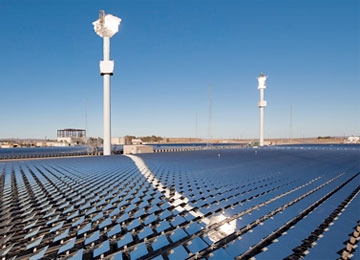 ESolar Lands Whopper Contract For Solar Thermal in ChinaJan 10, 2010 - Michael Kanellos - greentechsolar With this deal, eSolar now has a footprint in India, China, Africa and U.S. How did a company desperate for help a year ago go global in 12 months?
The Pasadena, Calif.-based specialist in solar thermal technology has landed a deal to license technology to Penglai Electric, which in turn will build 2 gigawatts of solar thermal power plants by 2021. Chinese banks will finance many projects and the equipment for the plants will be manufactured by local companies. In some cases, the actual power plants could be owned by other parties and then sold back to Penglai. Construction on the first 92 megawatts begins this year. The Chinese deal is the latest in a series of apparently successful steps in eSolar's new direction. The company, which was founded in 2007 but has technology roots that dip deeper into the past, initially planned to build and maintain its own power plant. Revenue would come from selling power. Enter the credit crisis. Although it had received VC funds from Google and others, eSolar found itself (like many other solar companies) short on cash to build infrastructure. As a result, it said it would start to license its technology and build equipment for others. It would pursue its own power plants when possible but concentrate much more on selling the know-how to established industrialists. Last March, eSolar signed a deal with Acme Group, an Indian company that also invested $30 million in eSolar. In October, eSolar said it would hire Clean Energy Solutions in Johannesburg to run its sales and distribution operation in seven countries in sub-Saharan Africa, including South Africa, Bostwana and Namibia. eSolar could ultimately become a software company. A pillar of its strategy is the software that orchestrates the movement of reflective heliostats (mirrors on a desert floor) to optimize the production of heat in a boiler on top of a tower. The heat needs to remain even, sort of like making a crème brulée. Founder Bill Gross came from the Internet world. The company also built a 5-megawatt power plant that it had started before the change in its business plan. The company's Sierra SunTower plant on 20 acres in Lancaster, Calif. in August, provides electricity from the plant to Southern California Edison. Although it sells the power commercially, the Lancaster project is really more of a demonstration plant. Ausra also embarked on a similar strategy around a similar time. However, instead of licensing deals, it is trying to sell itself. Three major industrialists are currently bidding on the company, according to sources. The bidding started after Siemens bought Solel, the grandaddy of solar thermal companies, for $418 million. eSolar's technology makes use of flat mirrors for heliostats to concentrate heat from the sun onto a water tank suspended on a tower. The water turns to steam which is then piped to a turbine for electricity generation. Founder Bill Gross says the company can produce power from solar thermal plants cheaper than competitors like BrightSource Energy, although BrightSource and others use very similar mirrors and towers. Who is really cheapest? We shall see. BrightSource is currently building a 440 megawatt plant in California. The deal also marks the fourth in a row between Chinese companies and U.S. alternative energy outfits. First Solar signed deals recently to license technology to Chinese companies to build large PV plants in that country. Meanwhile, on this side of the Pacific, A-Power Technologies, a Chinese wind turbine maker, is working with Chinese banks and some American companies to build a wind farm and turbine factory in Texas. Duke Energy Generation Services is teaming up with ENN, a sprawling Chinese conglomerate that employs 24,000 people, to build and operate solar power plants in the U.S. Coda Automotive, a Sino-U.S. auto company, wants to bring electric cars to the U.S. this year, so your next car, your next solar panel, and your next job could come from China. Last month, eSolar also announced that John Van Scoter from Texas Instruments would become CEO. I actually know Van Scoter from his TI days. He's an interesting character. He worked with theater owners while at TI to help them figure out ways to finance a transition to high dev movie theaters. |
Email this page to a friend


 Analysis--The change in strategy implemented about a year ago at eSolar seems to be working.
Analysis--The change in strategy implemented about a year ago at eSolar seems to be working.